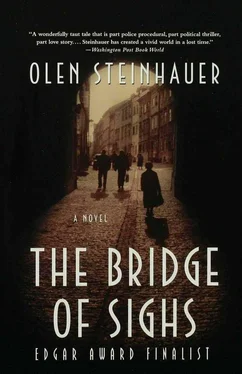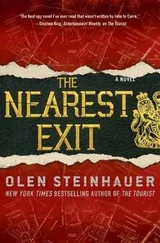Olen Steinhauer - The Bridge of Sights
Здесь есть возможность читать онлайн «Olen Steinhauer - The Bridge of Sights» весь текст электронной книги совершенно бесплатно (целиком полную версию без сокращений). В некоторых случаях можно слушать аудио, скачать через торрент в формате fb2 и присутствует краткое содержание. Жанр: Политический детектив, на английском языке. Описание произведения, (предисловие) а так же отзывы посетителей доступны на портале библиотеки ЛибКат.
- Название:The Bridge of Sights
- Автор:
- Жанр:
- Год:неизвестен
- ISBN:нет данных
- Рейтинг книги:3 / 5. Голосов: 1
-
Избранное:Добавить в избранное
- Отзывы:
-
Ваша оценка:
- 60
- 1
- 2
- 3
- 4
- 5
The Bridge of Sights: краткое содержание, описание и аннотация
Предлагаем к чтению аннотацию, описание, краткое содержание или предисловие (зависит от того, что написал сам автор книги «The Bridge of Sights»). Если вы не нашли необходимую информацию о книге — напишите в комментариях, мы постараемся отыскать её.
The Bridge of Sights — читать онлайн бесплатно полную книгу (весь текст) целиком
Ниже представлен текст книги, разбитый по страницам. Система сохранения места последней прочитанной страницы, позволяет с удобством читать онлайн бесплатно книгу «The Bridge of Sights», без необходимости каждый раз заново искать на чём Вы остановились. Поставьте закладку, и сможете в любой момент перейти на страницу, на которой закончили чтение.
Интервал:
Закладка:
“Comrade Inspector?” A fat man stood in the doorway, his pink arms spilling from a white sleeveless shirt stained by cooking grease and sweat. When he breathed, Emil could hear it across the room.
“Comrade Building Supervisor Aleksander Tudor?”
The supervisor nodded, lips pressed tight as he edged his way inside, peering at the body. His nose flared involuntarily.
“Close the door, will you?”
He did.
Emil held up the envelopes. “Since when do building supervisors deliver mail?”
“Two days. The mail was just sitting there.” His voice had a pleading note to it. “They might have been stolen. I worried.” His eyes fell again on the body, as though gravity pulled him there. Emil stared at the supervisor s white face until the eyes flickered back.
“Tell me what happened when you discovered the body. Every detail.”
Aleksander Tudor tried to breathe steadily. “Yesterday. Night, yes. After dinner.”
“So you were in your apartment.”
“The dogs.”
“Dogs?”
Aleksander Tudor nodded eagerly. “They were barking outside my window. Like always, but this time.” He closed his eyes then opened them. “This time I went to shoo them away. That’s when I noticed. His box. Comrade Crowder’s. Full of letters.” His loud exhale sounded choked. “Two days. Very irregular. But there was no answer,” he said. “To my knock.”
“And you had heard nothing before this?”
“Only the dogs.”
“No noise? No sounds of struggle?”
Aleksander Tudor shook his head stiffly.
“And you just came right in?”
“I have the key, Comrade Inspector.”
“You couldn’t slide them under the door?”
The supervisor turned toward the gaping, drafty space beneath the door. He turned back to Emil, mouth working but forming no words.
“Comrade Supervisor,” said Emil, slipping into the authoritarian tone the professors had made him practice for hours. “You seem disturbed. Do I disturb you?”
“I-” he began, then faltered. He leaned his full weight against the vanity; Emil could see the other half of his sweating face in the mirror. He blinked at the corpse, ready to faint.
Emil led him into the hallway, where frying oils obscured the smell of rot. “Try again?”
Tudor steadied himself on the railing, and finally formed words: “I was curious, Comrade. That’s all. I wanted to see if he was gone, or…I don’t know.” He shook his head.
Emil reached into his jacket and retrieved his notepad and a small pencil. 25 Aug 48. Victim: J Crowder. Interview: Apt Super, Aleks Tudor-found body. Delivering mail. Nerves, a wreck. “Did you suspect this?” he asked. “Before you opened the door.”
“This?”
“Murder. You heard nothing?”
“No. Oh, not at all.” When he shook his head, his flushed, damp cheeks trembled. “I only… wondered. You see?”
“How long has Comrade Crowder lived here?”
“Six, seven months? I need to look it up.”
Emil pointed at the door across from Crowder’s. Someone had painted it a garish red. “The neighbor?”
“Polacks,” Tudor whispered. Then, with a wry smile and a halfwink: “Genuine proles.
“Comrade,” Emil said, his voice now very official again, “this is a nation of proles. The proletarians have succeeded with the generous assistance of our friends to the east. Proles is the name by which we all live.”
Aleksander Tudor looked ready to cry.
CHAPTER FIVE
The Polish proles included a mother, father, three children and three grandparents. The door opened noisily, the thin, blond father shouting back for one of the children, a Marie, to shut up. But when Emil unfolded his green Militia certificate, a silence dropped over the household, as though even those out of eyeshot had seen an alarm blink in the other rooms.
“Come in,” said Tomislaw, the father, wiping a hand on his pants and then waving Emil inside.
There was the dense, familiar smell of boiled cabbage and overused sunflower oil in the fabric of the home. All three grandparents ushered him to a lace-covered dining table and served hot tea, while Tomislaw changed into a clean shirt. The grandparents-two of them women-stood against the stained, floral wallpaper and stared at him, smiling nervously, while the heavy, dark-haired wife herded the children into another room. But the whole time there, Emil could make out the children’s shadows beyond the cracked door.
Tomislaw appeared at another door, a fresh, brown shirt hanging from his bones. He smiled as he sat down. “What happened to Master Crowder,” he said, using the title a peasant would and simultaneously mauling the language with his accent. He pressed his lips together in a tight frown, shaking his head. “This city, it will get you.”
“Tom,” warned his wife. Her sturdy face looked unaccustomed to taking chances.
“But you heard something? From next door, I mean.”
“In this apartment?” asked Tomislaw, looking to the grandparents for support. All three faces nodded vigorously. “With the dogs outside and the kids in here, how can I hear a thing?”
The whole room was in agreement: it was an unassailable point. When Tomislaw smiled, his high, acne-speckled cheekbones became pronounced.
“Where do you work?”
Tomislaw sat up straight. “I assemble kneading machines. Huge.” He opened his arms wide. “For factory bread.”
“And how long have you lived here?”
“Two years,” the wife said quickly. “We were told to transfer, we have our papers. We were as surprised as you that we ended up in such a place.”
“Of course,” said Emil. But the inside of this aristocratic house, cluttered by their stout Polish furniture and water stains on the walls, no longer resembled anything aristocratic. He smiled reassuringly and opened his notepad. “I just wondered if you knew your neighbor.”
“Sure,” said Tomislaw, pointing to the door with an oil- darkened thumb. “Sometimes, we sat out there and had a vodka, maybe some brandy.” He used his thumb and forefinger to measure the height of a shot. “Just a little. Or his wine. Bull’s Blood. From Eger.” He raised his brow proudly. “He told me about his songs. You know his songs? There’s a right in the might of the valley!” he sang in a tuneless march, but Emil recognized it-again from kerchiefed children’s throats. He could hear the little ones in the next room giggling at their father’s performance. Their mother shot a silencing look at the door.
“What else did he talk about?”
Tomislaw ran his fingers through a pack of cigarettes, finally coming up with a twisted, loose one. Tobacco peppered the tabletop. “Money, what else? He said he could spend more than anyone he knew. Even with all those songs. Can you imagine? He always ran out.”
“He was broke?”
“Broke? I don’t know. To me he lived pretty well.”
The two grandmothers crossed themselves, and Tomislaw’s wife shifted in her chair.
“What about visitors?”
“He lived alone,” said the wife.
“I saw no one,” affirmed Tomislaw.
“No girlfriends?”
Tomislaw shrugged. “Maybe a hooker-one time, twice.”
“You saw them?”
He shook his head, almost sadly. “But no steady girlfriend, not this one. That I’m sure of.”
“How do you know?”
“You know,” said Tomislaw, smiling again, cheekbones high in his masculine knowledge, and the others nodded their agreement. “There was that one, though-”
“Girl?”
He shook his head.
“That was nothing,” his wife said. She cleared her throat significantly.
Tomislaw shrugged.
“What?” asked Emil.
“A plumber, I think.”
Читать дальшеИнтервал:
Закладка:
Похожие книги на «The Bridge of Sights»
Представляем Вашему вниманию похожие книги на «The Bridge of Sights» списком для выбора. Мы отобрали схожую по названию и смыслу литературу в надежде предоставить читателям больше вариантов отыскать новые, интересные, ещё непрочитанные произведения.
Обсуждение, отзывы о книге «The Bridge of Sights» и просто собственные мнения читателей. Оставьте ваши комментарии, напишите, что Вы думаете о произведении, его смысле или главных героях. Укажите что конкретно понравилось, а что нет, и почему Вы так считаете.












